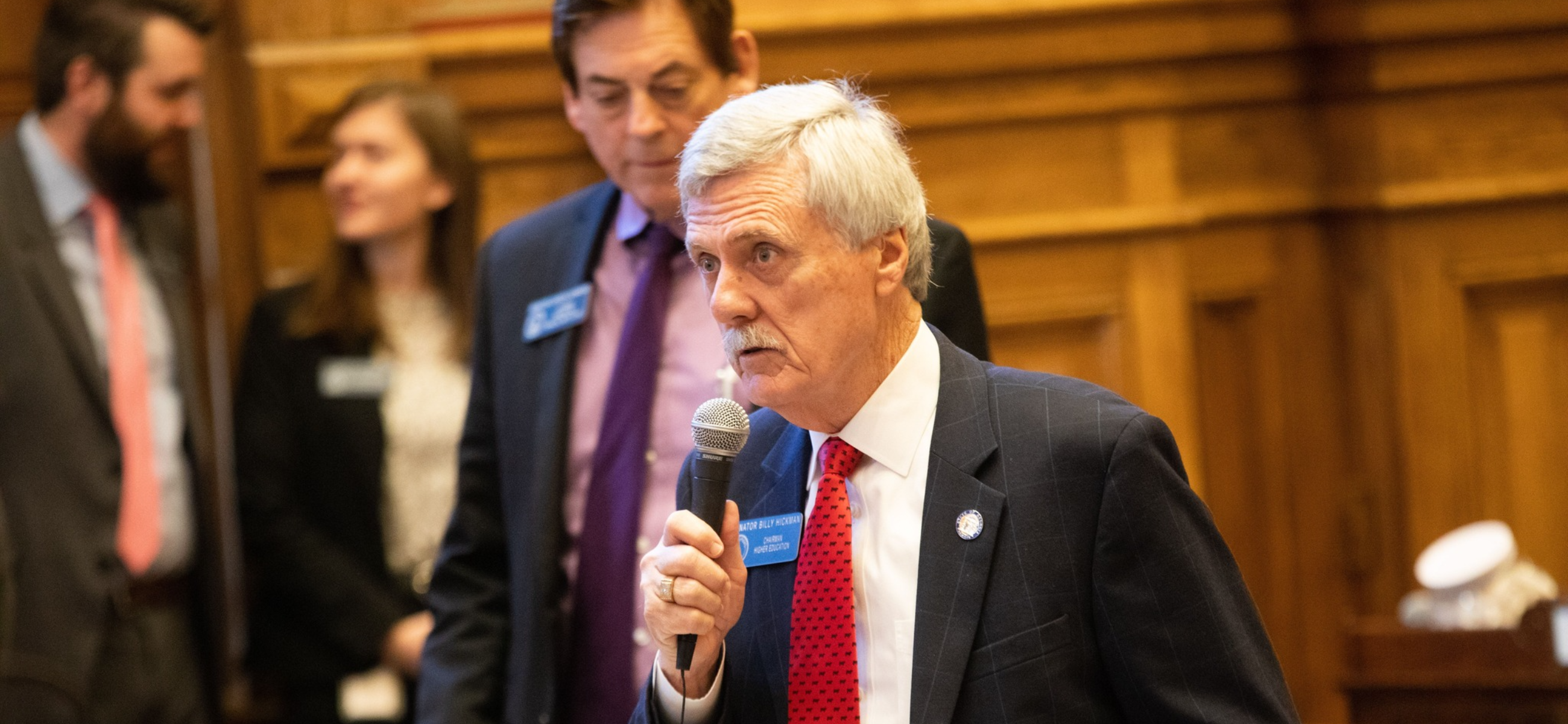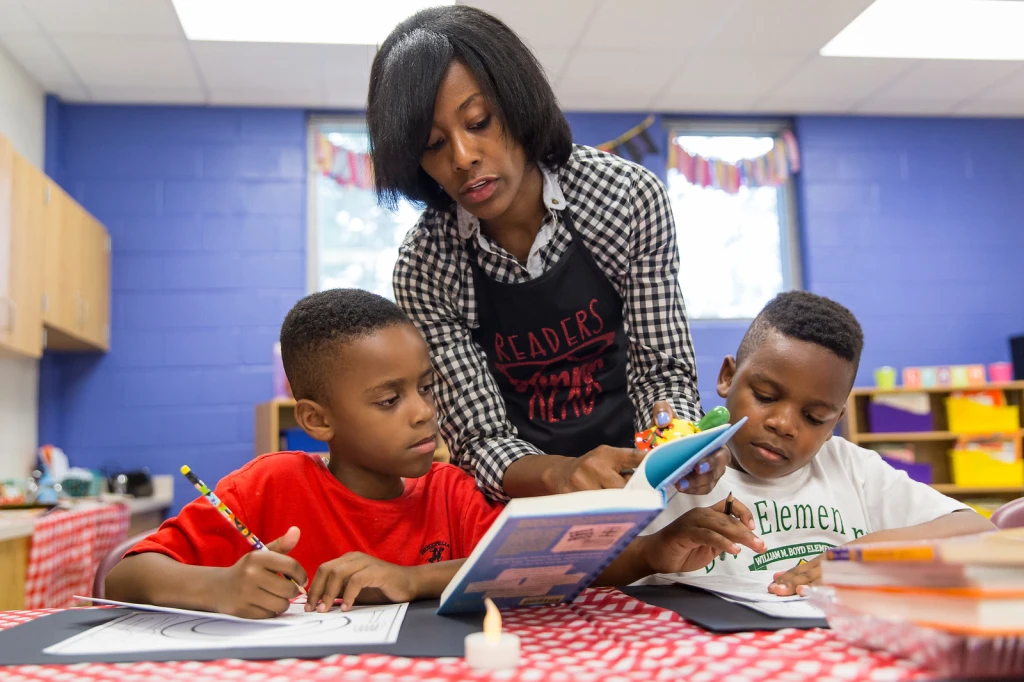Stay ahead of the curve as a political insider with deep policy analysis, daily briefings and policy-shaping tools.
Request a DemoNew state literacy council delves into the ‘science of reading’

Senator Billy Hickman speaks from his seat in the Senate chamber. (Credit: Georgia Senate)
STATESBORO — The new Georgia Council on Literacy created by Senate Bill 211 met in person for the first time this week.
Council members, who include state legislators, school leaders and education experts, laid out the framework for how they’ll work together over the next three years to improve reading outcomes and literacy rates for both children and adults.
A key focus of the meeting and the educational approach they expect to drive their success: adopting evidence-based methods of teaching literacy, commonly known as the science of reading.
What’s Happening
At a meeting held at Georgia Southern University in Statesboro on Monday, 28 of the 30 members of Georgia Council on Literacy met before an audience of about 150 people, including local educators, to discuss the goals and plans of the council, which is charged by SB 211 with engaging in a comprehensive review of birth to postsecondary programs to improve literacy, and recommending priorities for future investment by the state.
The council will work to implement HB 538, the Georgia Early Literacy Act, which aims to improve how reading is taught in pre-kindergarten through third grade. They’ll also help to continue implementing HB 48, a 2019 law that focuses on screening for and supporting students with dyslexia, a learning disorder that affects how people read and write.
House Speaker Jon Burns, R-Newington, told council members their work “will be led by your experiences, your training, your successes, and also some of your failures … Let’s deal with the facts … and bring back some good information, and I believe we can act on that for all Georgians.”
A central focus of the meeting was a presentation on the science of reading by Ryan Lee James, a speech language pathologist and director of the Rollins Center for Language and Literacy at the Atlanta Speech School.

James described the science of reading as “an interdisciplinary, decades-old and ever-growing body of research focused on how the brain learns to read. From this research we know that children require explicit systematic, diagnostic and cumulative instruction if they’re going to read, spell and write well.”
She noted that “structured literacy” programs aligned with the science of reading approach the phoneme, the smallest unit of language, in starkly different ways than the ‘whole language for balanced literacy’ approach to reading, which she said is based on inaccurate theories on how the brain learns to read, and that curricula aligned with it “have had damaging effects on children.”
Many teachers in Georgia are using this “flawed, disproven theory” to teach students how to read, she said, and urged the Council to “train them in the most up-to-date, evidence-based ways to teach reading while they’re in their pre-service programs. …We must also provide training, rigorous coaching and support for teachers in service, since so many graduated without the skills and knowledge they need.”
Why It Matters
The Council was created to address low literacy levels among children and adults in Georgia, and to produce a better educated workforce.
On the 2022 National Assessment of Educational Progress reading test, only 32% of fourth graders in Georgia scored at or above proficient levels. Georgia’s adult literacy rate is 76.4% and ranks 42nd in the U.S..
“For nine years we’ve been able to say we’re the number one place to do business,” said Scott Johnson, a business consultant who is chair of the Council. “If we’re going to keep that designation, we can’t do it unless we have graduates. … If we don’t have a literate workforce, those jobs will go somewhere else.”
“We have an illiteracy epidemic,” Sen. Billy Hickman, R-Statesboro, told State Affairs after the meeting. The author of SB 211, and chair of the Senate Higher Education Committee, Hickman said he pushed for the legislation to improve life outcomes for people in Georgia.
“When we put literacy as a priority in our state, we’ll reduce teenage pregnancy, we’ll reduce prison sentences, we’ll reduce human trafficking … a lot of these things are based on the fact that people don’t know how to read and drop out of school,” he said.
What’s Next
The Georgia Council on Literacy members divided themselves into four working groups focused on prenatal to 5-year-old children, kindergarten through third graders, teacher preparation and training, and community engagement, said Miranda Williams, who was appointed by Gov. Brian Kemp as the Georgia Literacy Coach, a new position created by SB 211. Her role is to align many of the state’s education-related agencies with the work of the Literacy Council, and to be an ambassador for reading around the state.
The next full meeting of the council is on October 17 at Kennesaw State University.
Hickman said for the rest of this year he’ll be focused on getting school and community leaders around the state, as well as his fellow legislators, more educated about and invested in improving literacy rates among school children.
Because the chairs of both of the General Assembly’s Appropriations committees (Matt Hatchett, R-Dublin, in the House, and Blake Tillery, R-Vidalia, in the Senate) are on the Literacy Council, Hickman said he’s hopeful that the substantial state spending on teacher training and new curriculum materials that the council will ultimately recommend will gain broad support in both chambers.
“I think they both have a big heart for this,” Hickman said. “The truth is we don’t have a choice but to invest deeply if we want to improve the outlook for our children.”
Have comments or tips on education issues? Contact Jill Jordan Sieder on Twitter @journalistajill or at [email protected].
Twitter @StateAffairsGA
Instagram @STATEAFFAIRSGA
Facebook @STATEAFFAIRSUS
LinkedIn @StateAffairs
Header photo: Senator Billy Hickman speaks from his seat in the Senate chamber. (Credit: Georgia Senate)
Professionals still face licensing delays amid state’s transition to online system
The Gist Georgia’s professionals and business owners are still struggling to obtain professional licenses in a timely manner. As the Secretary of State’s Office rolls out its new Georgia Online Application Licensing System to expedite the process, the efficiency of this new process is being put to the test. What’s Happening Thursday morning at the …
Controversy over AP African American Studies class grows
Rashad Brown has been teaching Advanced Placement African American Studies at Atlanta’s Maynard Jackson High School for three years. He’ll continue to do so — even though the state’s top education official removed it from the list of state-funded course offerings for the upcoming school year. While Brown prepares to start teaching his class on …
Students, teachers, lawmakers blast decision to end AP African American history classes
ATLANTA — A coalition of lawmakers, civil rights leaders, clergy, educators and students Wednesday called on the state’s education czar to rescind his decision to drop an advanced placement African American studies class from the state’s curriculum for the upcoming school year. “This decision is the latest attack in a long-running GOP assault on Georgia’s …
Kamala Harris’ presidential bid reinvigorates Georgia Democrats
Georgia Democrats have gained new momentum heading into the November election, propelled by President Joe Biden’s decision to bow out of his reelection bid and hand the reins to Vice President Kamala Harris. The historic decision, announced Sunday, is expected to prove pivotal in the national and state political arenas and breathe new life and …




